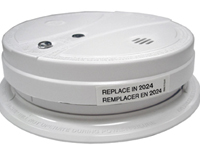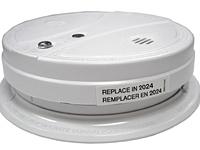Help your smoke alarm do its job
(NC) – In early October each year, fire departments across North America commemorate the Great Chicago Fire of 1871 with a week-long series of educational programs, school visits and special events. For 2014, the theme of Fire Prevention Week is, “Working Smoke Alarms Save Lives: Test Yours Every Month!”
While it may seem like stating the obvious, Canadian fire prevention officials are stressing the word “working” as they rollout this year's activities.
“It is scary to think about the number of Canadian homes that have smoke alarms with dead or no batteries and smoke alarms that have been gathering dust for decades,” says Carol Heller, a home safety specialist with Kidde Canada, the country's leading smoke and carbon monoxide alarm manufacturer. “This is not a trivial issue. In almost two-thirds of fatal house fires, investigators find that smoke alarms were either not installed, or, were missing batteries.”
Heller likes to broaden the task of simply testing smoke alarms monthly. She adds two critical considerations to make sure the alarms are working when you need them the most:
Check the age of the alarm as part of the test.
If an alarm sounds when you push the Test button, that means circuits are working and power is getting to the unit. It does not mean the alarm's sensors are operating at full sensitivity. After being exposed to years of dust, cooking grime, pet fur and other airborne contaminants sensors can lose responsiveness, slowing the alarm's reaction time and reducing your time to escape. RULE: If your smoke alarm is more than 10 years old or you can't remembers its age, whether it is hardwired or battery-powered, replace it immediately.
False alarms are no excuse for leaving your family unprotected.
For a smoke alarm to do its job it needs to be less than 10 years old, installed correctly – and be adequately powered. If you took an alarm down or removed its batteries last Christmas when you burned the turkey, enough is enough. RULE: Put the alarm back up and install fresh batteries.
To reduce false alarms, install Photoelectric smoke alarms near kitchen areas. And make sure that hardwired alarms have battery backup in case of a power outage.
“Smoke alarms are high tech devices,” Heller adds. “So for safety's sake test your alarms and make sure you install fresh batteries once per year. But whatever you do, replace any alarms that are more than 10 years old. Putting fresh batteries into old alarms is not only a waste of money, it could cost you your life.”
Comments
There are 0 comments on this post













